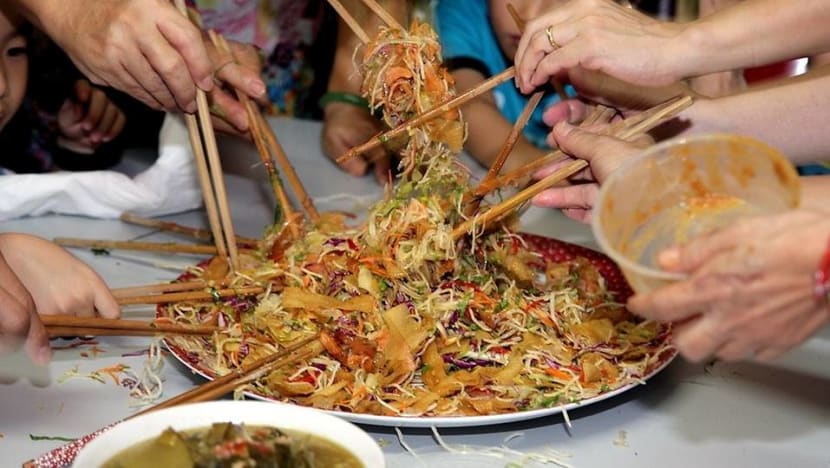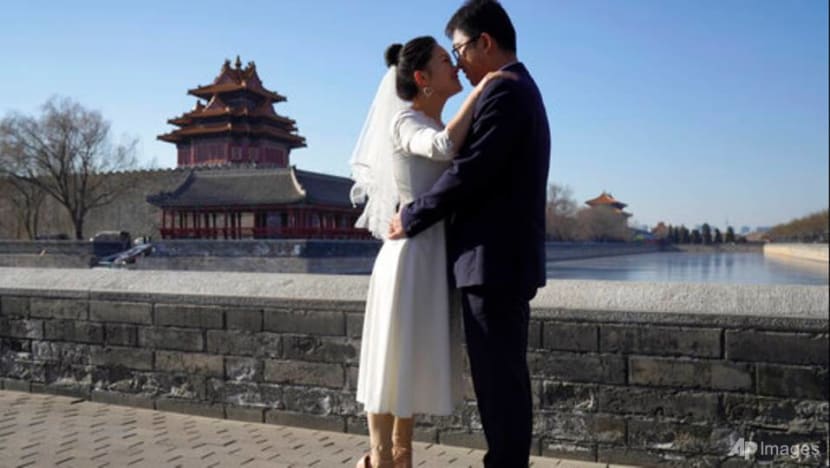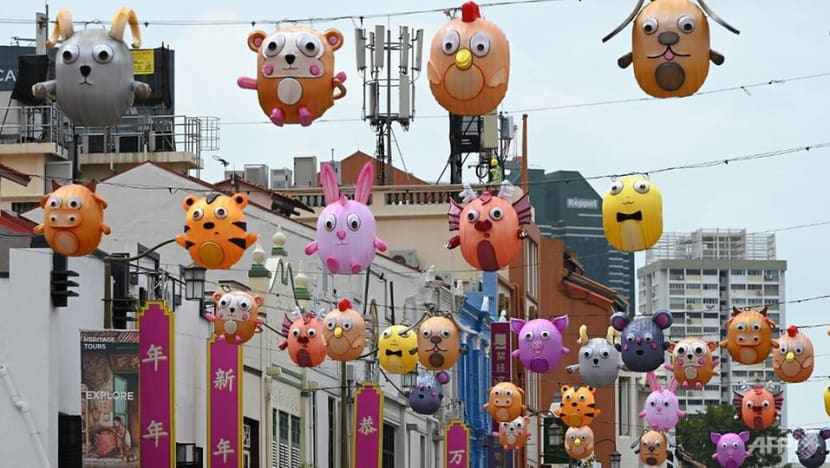commentary Commentary
Commentary: Fresh COVID-19 restrictions are turning Chinese New Year into a social landmine for families
Perhaps a temporary break in our millenium-old traditions and festive habits will give us a new perspective and deeper appreciation of Chinese New Year, says Annie Tan.

Pedestrians wait along a street intersection decorated for Chinese New Year in Chinatown, Singapore on Jan 19, 2021. (Photo: AFP/Roslan Rahman)
SINGAPORE: In a manner of speaking, Chinese New Year had always been one mega open-house for the entire “clan”.
No one ever received an official invite, and no one ever needed one either.
There has always been an unspoken understanding that if you were even remotely related to someone, whether by blood or some decade-old family friendships, then you were naturally welcome, and in some cases, expected to visit.
From sprawling landed properties to cosier three-room HDB flats, there was never any question of space limit either. No matter if the hosts ran out of sitting space or serving cups. This was the season plastic chairs and Yeo’s packet drinks were invented for.
It had always been a boisterous and, in many ways, exhausting period for both hosts and house-hopping guests. Many families spent weeks leading up to the festival cleaning, shopping and cooking just to adequately prep for this immense social marathon.
Of course, we can count on COVID-19 to effortlessly break even the longest standing millennium-old traditions. As we celebrate Chinese New Year under the shadow of the global pandemic this year, we can expect a totally different season and vibe.
READ: Commentary: Phase 3 will bring us much-needed closure to a difficult year
NOT REPEATING THE MISTAKES OF 2020
Foremost among the new restrictions in Singapore is the eight visitors per household per day limit, announced by the Ministry of Health (MOH) and effective since Tuesday (Jan 26).
Guests are also limited to visiting two households a day, and should keep their face masks on during these social calls.
The popular tradition of lohei (the prosperity toss) is to become a quiet affair as well, as masked groups of eight toss yusheng silently into the air, replacing noisy four-word incantations with private petitions. Any verbalisation of auspicious phrases is strictly prohibited, and will be subject to enforcement checks.

These festive restrictions may seem drastic to some, but many will recall that Chinese New Year was believed to be a major contributing factor for the rapid early spread of COVID-19 in China last year.
And with such clear precedents, the last thing we want to be held guilty for refusing to learn from history.
READ: Commentary: Looks like containment of novel coronavirus not as effective as we had hoped
Some are understandably reluctant to scale back on these once-a-year gatherings with siblings, relatives and family friends. Children will also dearly miss the hongbao (red packets) and all-day guilt-free binging passes during these visits.
However, while it may be difficult, Singaporeans have endured these restrictions for Hari Raya and Deepavali last year, and will somehow find a way to manage again for Chinese New Year this year.
WILL SUCH CHANGES BE DIVISIVE?
Fewer guests and social visits should mean less work, right? After all, entertaining more than 20 guests at a time is no mean feat. In fact, some of my friends’ mothers are secretly rejoicing about the much-needed break this year.
But it is really not all that simple. The eight-person limit introduces a new layer of complexity. Who should you invite? And more importantly, who should you un-invite?
Should we keep your guest list to immediate family? And who exactly qualifies as immediate family? For bigger families with more than eight siblings, should you include partners and kids? Should large families have a hosting roster? And if so, which guests should they schedule on the same day?
Indeed, this makes Chinese New Year visiting almost as complicated as arranging a traditional Chinese wedding dinner with limited capacity and fixed seating.

To navigate the “social landmines”, you will need to not only consider your relationship with someone, but their relationship with your mother, father and grandmother, their relationship with one another, as well as their place on the family hierarchy.
In many ways, it is a high-level, high-stress test in family history and diplomacy. No slots left for a few people? Can’t find a good time to spread out visits across the 15 days of Chinese New Year because of work and other conflicting commitments? Then, be prepared to ruffle a few feathers.
My good friend’s mother originally intended to invite her siblings sans partners and children this year. However, because many were not keen to spend the festive season without their immediate families, she might cancel the gathering altogether and replace it with a Zoom reunion.
On a separate note, there is also the question of how to enforce such restrictions in private homes. Without everyone playing their part, would we end up relying on whistle-blowing neighbours? And how will this sour neighbourly relationships?
READ: Commentary: For your neighbours’ sake, turn the volume down this stay-home period
Wouldn’t it be deeply regretful if a festival about reunion and togetherness ends up driving a wedge between relatives and neighbours?
DISRUPTIONS PAVE THE WAY FOR POSITIVE CHANGE
With that said, it is possible to find a silver lining in this rare disruption of old traditions and deeply ingrained habits.

After all, for a many, prepping for Chinese New Year has become a matter of routine. We go through the motions of changing our wardrobes, sprucing our hair, spring cleaning, snack shopping and making social visits almost on autopilot. Few of us put much thought into these yearly routines.
When it comes to social visits, few also appreciate the immense level of prep that goes into hosting mega-gatherings, including stocking up on food items, cooking and post-party cleaning.
Indeed, a large percentage of the younger generation view these visits as little more than social obligations they grudgingly fulfil to placate their parents. Half the time, many can be seen glued to their mobile phones.
READ: Commentary: So your child wants to be a YouTube star?
In some ways, it is hard to blame them. With so many relatives to call on, such fleeting visits and diverse groups, conversation is often as superficial as during large wedding dinners.
On roulette would be standard topics such as relationships, marital status and academic performances. And indeed, it is not hard to imagine why many would be uncomfortable opening up about such sensitive topics with large groups of boisterous relatives over a tepid bottle of chrysanthemum tea.
So perhaps this temporary break in tradition and routine may give us new perspective and a new way forward.
READ: Commentary: Chinese New Year shouldn’t be the only time we meet our extended family
For one, this year, out of sheer necessity, we will be forced to re-evaluate our relationships, and consider which bonds are most important and add value to our lives.
And rather than being blasé about reunions and grudgingly following a pre-determined visiting schedule, we can be more proactive and intentional about making contact and maintaining these important links, be it with aunts or cousins who have made a positive impact on our lives at some point.
READ: IN FOCUS: How a year of COVID-19 changed Singapore forever
Whittling down our party to eight will also create more closely knit groups and enable us to engage in more meaningful conversations, instead of wandering blindly among a noisy crowd while grazing on too many pineapple tarts.
Despite all the restrictions, if we make it a point to be fully present and engaged when we meet each group of eight relatives or family friends, we will forge much stronger bonds than during the largest family gatherings. We will also be the richer for it.
Perhaps then, this year’s unconventional and inconvenient Chinese New Year is just the nudge we need to find new purpose and meaning in the most important festival on the Chinese calendar so that we stop taking such family reunions for granted.
Listen to experts discuss if they will give e-hongbaos this Chinese New Year season on CNA's Heart of the Matter podcast published in February 2020:
Annie Tan is a freelance writer.














